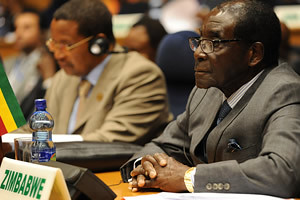
Republic of Zimbabwe President Robert Mugabe at the African Union Summit in Addis Ababa, Ethiopia on July 16, 2012. Mugabe said the sovereignty of Africa should be respected., a photo by Pan-African News Wire File Photos on Flickr.
EU extends sanctions
Tuesday, 24 July 2012 00:00
Zvamaida Murwira Senior Reporter
Zimbabwe Herald
THE European Union yesterday extended the illegal sanctions imposed on Zimbabwe by another year saying it will consider reviewing the embargoes after the country holds a referendum on the envisaged new constitution.
The Council of Ministers of the EU met in Brussels yesterday and resolved to extend the illegal embargoes.
In a statement, the EU said in line with its “incremental approach,” it would adjust its policy to recognise progress made by Harare along with the Sadc roadmap.
“The EU agrees that a peaceful and credible constitutional referendum would represent an important milestone in the preparation of democratic elections that would justify a suspension of the majority of all EU targeted restrictive measures against individuals and entities,” reads the statement by the Foreign Affairs Council after its meeting in Brussels.
Addressing journalists in Harare yesterday, EU representative to Zimbabwe, Mr Aldo Dell’ Ariccia, said the bloc was encouraged by progress made by the parties to the GPA.
He said the decision was also made in the framework of the dialogue established between Zimbabwe and EU through the re-engagement committee and efforts by Sadc.
“The Council has decided to extend the measures with one year, up to August,” said Mr Dell’Ariccia.
He said the bloc had, however, lifted a suspension on developmental support on Harare as it would now directly deal with the Zimbabwean Government.
Mr Dell’Ariccia, however, said the move would only become effective from 2014 to 2020 as the bloc’s current assistance were already running until 2013.
The sanctions imposed after Government introduced the land reform programme to correct colonial imbalances include travel bans on President Mugabe, his immediate family and senior Government and Zanu-PF officials as well as some companies’ representatives.
This is despite the fact that the bloc acknowledged progress made by parties in the Global Political Agreement.
However, head of the Zimbabwe Re-engagement Committee and MDC-T negotiator, Mr Elton Mangoma, condemned the extension last night saying that was not what they had expected.
“That is not what we had recommended. It means they are not listening to us. They are listening to someone else. But we will continue engaging them,” said Mr Mangoma, who is also Energy and Power Development Minister and deputy treasurer in the MDC-T.
Zanu-PF negotiator and Justice and Legal Affairs Minister, Patrick Chinamasa, said he would give a comment after studying the statement.
“I have not yet seen the resolution and I would not want to comment before I see it,” he said.
MDC-N negotiator, Mr Priscilla Misihairabwi-Mushonga, said she would only comment when she sees the resolution.
“I am in Hong Kong right now and have not seen it,” said Mr Misihairabwi-Mushonga, who is also Regional Integration and International Co-operation Minister.
In its statement, the EU hailed efforts made to implement the GPA, a meeting held by a Zimbabwean delegation with EU representatives in Brussels and a commitment by Sadc to support the implementation of the GPA.
It also hailed the visit to Harare by the United Nations High Commissioner for Human Rights, Ms Navi Pillay.
“It recognises the improvement that has been achieved in the human rights situation although significant areas of concern remain,” read the statement.
Mr Dell’Ariccia said progress made by partners included the passage of the Zimbabwe Human Rights Bill and the Electoral Amendment Bill.
“These are important milestone. We are taking stock of important aspects,” he said.
“We are not benchmarking Zimbabwe or putting conditions but this is what Zimbabwe has committed itself to do.”
Asked what would happen if the Draft Constitution is rejected in a referendum, Mr Dell’Ariccia said the bloc was merely concerned with the environment the process would be held.
“Whatever the result, as long as it is held in a peaceful environment,” he said.
On aid, Mr Dell’Ariccia said Zimbabwe would now have to make its proposal to be included in EU programmes during the 2014-2020 window.
The EU imposed the illegal sanctions against Zimbabwe when Harare redistributed land from the white minority to the black majority in 2002. The United States also slapped the country with sanctions after enacting the Zimbabwe Democracy and Economic Recovery Act in 2001.
Sadc, the African Union, the Non-Aligned Movement and Comesa, among other progressive bodies, have condemned the sanctions as unjustified.
No comments:
Post a Comment